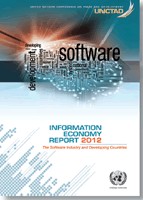 Great news: Yesterday, UNCTAD launched its latest Information Economy Report. Free and Open Source Software is discussed extensively in this years’ edition, which has a focus on “The Software Industry and Developing Countries”. Also great news: the FOSSFA/GIZ capacity building programme ict@innovation is featured prominently, both in the report and at its Africa launch, which was held yesterday at the United Nations Conference Center in Addis, at the United Nations Economic Commission for Africa. The embargo has been lifted on the document and I recommend its reading to all FOSS activists and businesses.
Great news: Yesterday, UNCTAD launched its latest Information Economy Report. Free and Open Source Software is discussed extensively in this years’ edition, which has a focus on “The Software Industry and Developing Countries”. Also great news: the FOSSFA/GIZ capacity building programme ict@innovation is featured prominently, both in the report and at its Africa launch, which was held yesterday at the United Nations Conference Center in Addis, at the United Nations Economic Commission for Africa. The embargo has been lifted on the document and I recommend its reading to all FOSS activists and businesses.
Congrats to everyone, who has been steering those processes in the past year! Cheers, Balthas
Excerpts of the report and its press release, which I liked (among others):
On FOSS:
“The Report recommends that Governments use public procurement related to e-government systems as a strategic tool to spur domestic demand for software. In this context, the reliance on open standards and free and open source software (FOSS) is desirable when it offers competitive solutions to domestic needs, the Report contends. By promoting grassroots creativity, innovation, leadership and teamwork, FOSS can support learning processes that enable users to become creators of software rather than just passive adopters of software technology, the Report says. Other strategic advantages of FOSS include a lowering of the cost of ownership for new software, and a reduction in errors. New developments in the ICT landscape, with the growing importance of cloud computing, mobile applications and “big data”, are further expanding the role of FOSS.”
On crowsourced software production out of developing countries:
Better access to high-speed Internet has rapidly made online work (also referred to as crowdsourcing or remote, contract, or freelance work) a prominent feature in global software development, the Report says. Many software writers in developing countries are already involved in such activities. For example, Elance.com, one of the main platforms for online work, engages workers from over 150 countries. In Bangladesh, some 10,000 freelance programmers are reportedly earning some $15 million per year – an amount that is equivalent to a quarter of the country’s software exports.
On ict@innovation:
“ict@innovation has helped to create a community of more than 1,200 African and international experts who are exchanging knowledge on FOSS as a key technology to drive innovation, add local value and create sustainable and affordable ICT solutions in African economies.”
On FOSSFA:
“Largely thanks to the advocay work of FOSSFA, among its significant contributions are, that both the African Union and the Common Market for Eastern and Southern Africa (COMESA) have adopted pro-FOSS policies.”
Here’ the full report: http:/
Here’s the press release:
http:/
____
Note: This text was first published on the blog of Balthas Seibold at the Alumniportal Germany (www.alumniportal-deutschland.org/en/). Check the blog ( register or login first). All blog entries represent the personal views and ideas of Balthas Seibold.